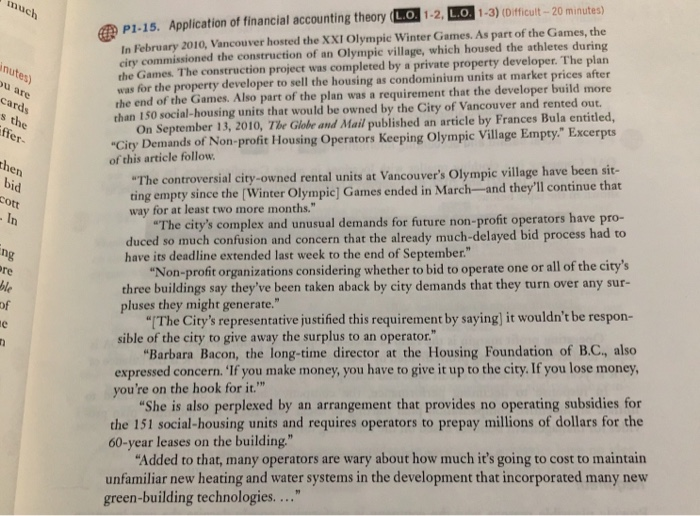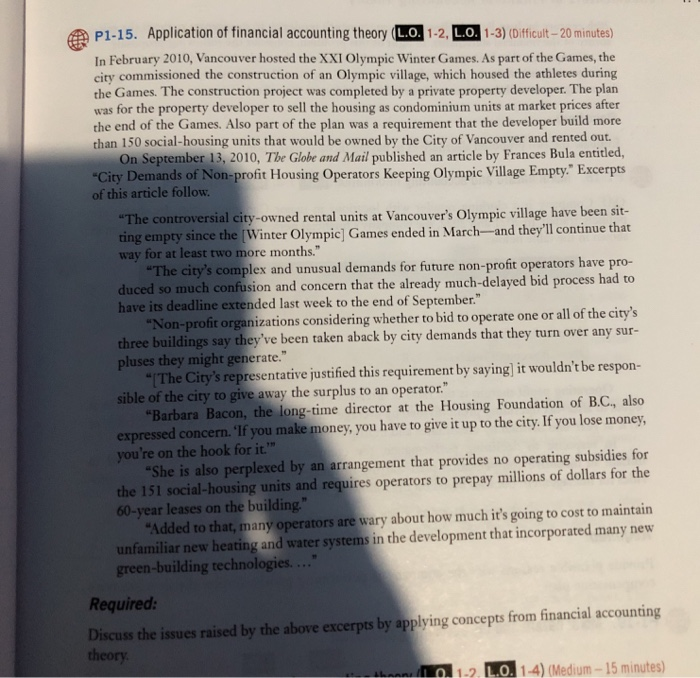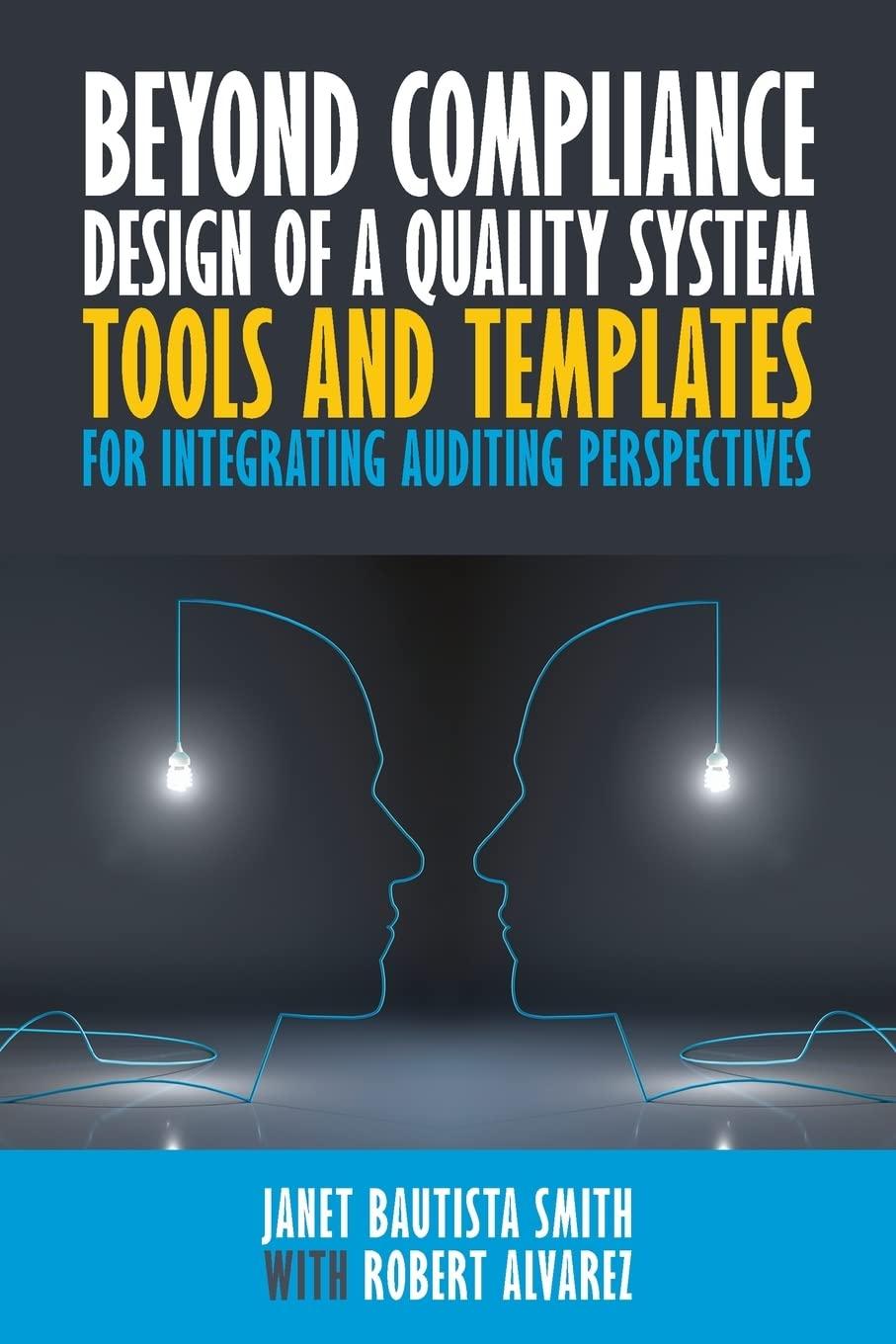much Arvutes) u are cards s the affer then bid cott -In ing ore P1-15. Application of financial accounting theory (L.O. 1-2, L.O. 1-3) (Difficult - 20 minutes) In February 2010, Vancouver hosted the XXI Olympic Winter Games. As part of the Games, the ciry commissioned the construction of an Olympic village, which housed the athletes during the Games. The construction project was completed by a private property developer. The plan was for the property developer to sell the housing as condominium units at market prices after the end of the Games. Also part of the plan was a requirement that the developer build more than 150 social housing units that would be owned by the City of Vancouver and rented out. On September 13, 2010, The Globe and Mail published an article by Frances Bula entitled, "City Demands of Non-profit Housing Operators Keeping Olympic Village Empty." Excerpts of this article follow. "The controversial city-owned rental units at Vancouver's Olympic village have been sit- ting empty since the Winter Olympic Games ended in March-and they'll continue that way for at least two more months." "The city's complex and unusual demands for future non-profit operators have pro- duced so much confusion and concern that the already much-delayed bid process had to have its deadline extended last week to the end of September." "Non-profit organizations considering whether to bid to operate one or all of the city's three buildings say they've been taken aback by city demands that they turn over any sur- pluses they might generate." "[The City's representative justified this requirement by saying) it wouldn't be respon- sible of the city to give away the surplus to an operator." "Barbara Bacon, the long-time director at the Housing Foundation of B.C., also expressed concern. 'If you make money, you have to give it up to the city. If you lose money, you're on the hook for it." "She is also perplexed by an arrangement that provides no operating subsidies for the 151 social housing units and requires operators to prepay millions of dollars for the 60-year leases on the building." "Added to that, many operators are wary about how much it's going to cost to maintain unfamiliar new heating and water systems in the development that incorporated many new green-building technologies...." ble of ne P1-15. Application of financial accounting theory L.O. 1-2, L.O. 1-3) (Difficult 20 minutes) In February 2010, Vancouver hosted the XXI Olympic Winter Games. As part of the Games, the city commissioned the construction of an Olympic village, which housed the athletes during the Games. The construction project was completed by a private property developer. The plan was for the property developer to sell the housing as condominium units at market prices after the end of the Games. Also part of the plan was a requirement that the developer build more than 150 social housing units that would be owned by the City of Vancouver and rented out. On September 13, 2010, The Globe and Mail published an article by Frances Bula entitled, *City Demands of Non-profit Housing Operators Keeping Olympic Village Empty." Excerpts of this article follow "The controversial city-owned rental units at Vancouver's Olympic village have been sit- ting empty since the Winter Olympic Games ended in March and they'll continue that way for at least two more months." "The city's complex and unusual demands for future non-profit operators have pro- duced so much confusion and concern that the already much-delayed bid process had to have its deadline extended last week to the end of September." "Non-profit organizations considering whether to bid to operate one or all of the city's three buildings say they've been taken aback by city demands that they turn over any sur- pluses they might generate." "[The City's representative justified this requirement by saying it wouldn't be respon- sible of the city to give away the surplus to an operator." "Barbara Bacon, the long-time director at the Housing Foundation of B.C., also expressed concern. 'If you make money, you have to give it up to the city. If you lose money, you're on the hook for it.' She is also perplexed by an arrangement that provides no operating subsidies for the 151 social-housing units and requires operators to prepay millions of dollars for the 60-year leases on the building." "Added to that, many operators are wary about how much it's going to cost to maintain unfamiliar new heating and water systems in the development that incorporated many new green-building technologies...." Required: Discuss the issues raised by the above excerpts by applying concepts from financial accounting theory 1-2 L.O. 1-4) (Medium - 15 minutes) much Arvutes) u are cards s the affer then bid cott -In ing ore P1-15. Application of financial accounting theory (L.O. 1-2, L.O. 1-3) (Difficult - 20 minutes) In February 2010, Vancouver hosted the XXI Olympic Winter Games. As part of the Games, the ciry commissioned the construction of an Olympic village, which housed the athletes during the Games. The construction project was completed by a private property developer. The plan was for the property developer to sell the housing as condominium units at market prices after the end of the Games. Also part of the plan was a requirement that the developer build more than 150 social housing units that would be owned by the City of Vancouver and rented out. On September 13, 2010, The Globe and Mail published an article by Frances Bula entitled, "City Demands of Non-profit Housing Operators Keeping Olympic Village Empty." Excerpts of this article follow. "The controversial city-owned rental units at Vancouver's Olympic village have been sit- ting empty since the Winter Olympic Games ended in March-and they'll continue that way for at least two more months." "The city's complex and unusual demands for future non-profit operators have pro- duced so much confusion and concern that the already much-delayed bid process had to have its deadline extended last week to the end of September." "Non-profit organizations considering whether to bid to operate one or all of the city's three buildings say they've been taken aback by city demands that they turn over any sur- pluses they might generate." "[The City's representative justified this requirement by saying) it wouldn't be respon- sible of the city to give away the surplus to an operator." "Barbara Bacon, the long-time director at the Housing Foundation of B.C., also expressed concern. 'If you make money, you have to give it up to the city. If you lose money, you're on the hook for it." "She is also perplexed by an arrangement that provides no operating subsidies for the 151 social housing units and requires operators to prepay millions of dollars for the 60-year leases on the building." "Added to that, many operators are wary about how much it's going to cost to maintain unfamiliar new heating and water systems in the development that incorporated many new green-building technologies...." ble of ne P1-15. Application of financial accounting theory L.O. 1-2, L.O. 1-3) (Difficult 20 minutes) In February 2010, Vancouver hosted the XXI Olympic Winter Games. As part of the Games, the city commissioned the construction of an Olympic village, which housed the athletes during the Games. The construction project was completed by a private property developer. The plan was for the property developer to sell the housing as condominium units at market prices after the end of the Games. Also part of the plan was a requirement that the developer build more than 150 social housing units that would be owned by the City of Vancouver and rented out. On September 13, 2010, The Globe and Mail published an article by Frances Bula entitled, *City Demands of Non-profit Housing Operators Keeping Olympic Village Empty." Excerpts of this article follow "The controversial city-owned rental units at Vancouver's Olympic village have been sit- ting empty since the Winter Olympic Games ended in March and they'll continue that way for at least two more months." "The city's complex and unusual demands for future non-profit operators have pro- duced so much confusion and concern that the already much-delayed bid process had to have its deadline extended last week to the end of September." "Non-profit organizations considering whether to bid to operate one or all of the city's three buildings say they've been taken aback by city demands that they turn over any sur- pluses they might generate." "[The City's representative justified this requirement by saying it wouldn't be respon- sible of the city to give away the surplus to an operator." "Barbara Bacon, the long-time director at the Housing Foundation of B.C., also expressed concern. 'If you make money, you have to give it up to the city. If you lose money, you're on the hook for it.' She is also perplexed by an arrangement that provides no operating subsidies for the 151 social-housing units and requires operators to prepay millions of dollars for the 60-year leases on the building." "Added to that, many operators are wary about how much it's going to cost to maintain unfamiliar new heating and water systems in the development that incorporated many new green-building technologies...." Required: Discuss the issues raised by the above excerpts by applying concepts from financial accounting theory 1-2 L.O. 1-4) (Medium - 15 minutes)








